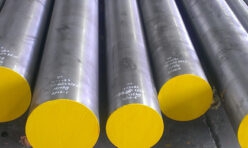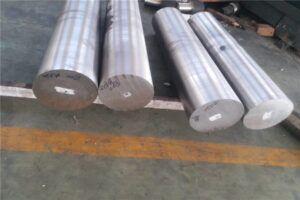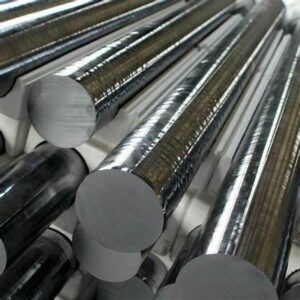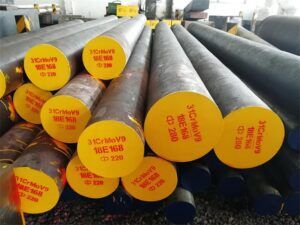A8 Air Hardening Cold Work Tool Steel

A8 steel Air Hardening Cold Work Tool Steel
1 A8 Steel Introduction
A8 steel is an air-hardening cold work tool steel. It exhibits good wearing qualities with excellent toughness characteristics. It is well suited for many metals working dies and punches, which operate in the hardness of Rockwell C 55-60. The combination of toughness and wear resistance make WM A-8 an excellent choice for applications that require higher toughness than that of the high-carbon, high-chromium steels such as D2 & better wear resistance than that of shock-resisting steels such as S7. For hot work tooling applications, A8 provides better resistance to erosion, wear and wash-out than the typical chromium-molybdenum hot work steels such as H11 and H13. However, it is not recommended for hot applications where thermal fatigue (heat checking) is the primary failure mode.
2 A8 Steel Applications
a8 steel can be used in punches, drift pins, pneumatic tools, chuck jaws, hammers, hot rolls, and hot and cold shear knives.
3 Quality Standard
: ASTM A681 – 08 Standard Specification for Tool Steels Alloy.
4 A8 Steel Chemical Composition(%)
| C | Si | Mn | P | S | Cr | Mo |
|---|---|---|---|---|---|---|
| 0.50-0.60 | 0.10-0.70 | 1.80-2.50 | 0.030 max | 0.030 max | 0.90-1.40 | 0.90-1.40 |
Smelting Option
1 EAF: Electric Arc Furnace
2 EAF+LF+VD: Refined-smelting and vacuum degassing
3 EAF+ESR: Electro Slag Remelting
4 EAF+PESR: protective atmosphere Electro Slag Remelting
5 VIM+PESR: Vacuum induction melting
Forming Option
1 Hot rolling process
2 Hot Forging: Electro-hydraulic; High-speed-hydraulic; Oil-hydraulic; Precision-forging
Heat-treatment Option
1 +A: Annealed (full/soft/spheroidizing)
2 +N: Normalized
3 +NT: Normalized and tempered
4 +QT: Quenched and tempered (water/oil)
Suface Option
1 Black Surface
2 Grounded: Bright but rough ; Not precision
3 Machining for plate: Bright and precision; Little turning scar
4 Peeled/Turned: Bright and precision; Little turning scar
5 Polished: Very Bright and precision size; Not turning scar
Other Services
1 Cutting: Small pieces
2 CNC Machine: Produce as your drawing
3 Package: Bare/Nylon/Canvas/Wooden
4 Payment:T/T, L/C, O/A(request credit)
5 Transport:FOB/CFR/CIF/DDU/DDP (train/ship/Air)
Mechanical Properties
The mechanical properties of A8 tool steels are displayed in the following table.
| Properties | Metric | Imperial |
|---|---|---|
| Poisson’s ratio | 0.27-0.30 | 0.27-0.30 |
| Elastic modulus | 190-210 GPa | 27557-30457 ksi |
| Bulk Modulus (typical for steels) | 140 GPa | 20300 ksi |
| Shear modulus (typical for steels) | 80 GPa | 11600 ksi |
| Hardness, Rockwell C | 48 – 57 | 48 – 57 |
| Machinability (based on carbon tool steel) | 65 | 65 |
5 HEAT TREATMENT
Preheating: Heat at a rate not exceeding 400°F per hour to 1400-1450°F and equalize.
Austenitizing: Heat slowly from the preheat. Furnace or Salt: 1825-1850°F. Soak for 30 minutes for the first inch of thickness, plus 15 minutes for each additional inch.
Annealing: Annealing must be performed after hot working and before rehardening.
Heat at a rate not exceeding 400°F per hour to 1550°F, and hold at temperature for 1 hour per inch of maximum thickness; 2 hours minimum. Then cool slowly with the furnace at a rate not exceeding 50°F per hour to 1000°F. Continue cooling to ambient temperature in the furnace or in air. The resultant hardness should be a maximum of 241 HBW.
Hardening: Air, pressurized gas, or interrupted oil to 150-125°F.
Note: Sizes over 5 inches in cross section may not achieve full hardness by cooling in still air. It is usually necessary to increase the quench cooling rate between 1400 to 900°F by using an air blast, pressurized gas, or an interrupted oil quench. For the oil quench, quench until black, about 900°F, then cool in still air to 150-125°F.
Tempering: Temper immediately after quenching. Hold temperature for 1 hour per inch of thickness, 2 hours minimum, then air cool to ambient temperature. The typical tempering range is 300 to 600°F. Double tempering is recommended for tempering temperatures of 900°F and higher.
To minimize internal stresses in cross sections greater than 6 inches and to improve stability in tools that will be EDM’d after heat treatment, a soaking time of 4 to 6 hours at the tempering temperature is strongly recommended.

Regular size and Tolerance
| 1) Hot Rolled round bar | |||
| Diameter (mm) |
Diameter Tolerance (mm) |
Diameter (mm) |
Diameter Tolerance (mm) |
| ≤12.70 | -0.13 ~0.30 | >50.80~63.5 | -0.25~0.76 |
| 12.7~25.40 | -0.13~0.41 | >63.50~76.20 | -0.25~1.02 |
| >25.4~38.10 | -0.15~0.51 | >76.20~101.60 | -0.30~+1.27 |
| >38.1~50.80 | -0.20~0.64 | >101.60~203.20 | -0.38~3.81 |
| 2) Hot Rolled steel plate | |||
| Thickness (mm) |
Thickness Tolerance (mm) |
Thickness (mm) |
Thickness Tolerance (mm) |
| ≤25.4 | -0.41~0.79 | >127~152 | -1.60~2.39 |
| >25.4~76 | -0.79~1.19 | >178~254 | -1.98~3.18 |
| >76~127 | -1.19~1.60 | >254~305 | -2.39~3.96 |
Mill′s test certificate
EN 10204/3.1 with all relevant data reg. chem. composition, mech. properties and results of testing.




